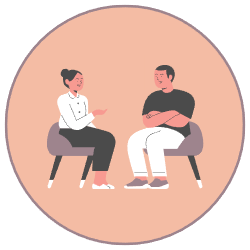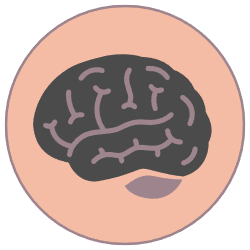Trauma Therapy San Diego
Therapy for Trauma

A traumatic event can happen anytime, anywhere. To make matters worse, the residual effects of these events can last for years, worsening your quality of life and making every day feel like a battle just to function. Fortunately, help is available — and more accessible than you might think.
If you believe that you might be experiencing the effects of trauma, Inward Healing Therapy can help. We offer a comprehensive range of online therapy services to individuals in San Diego and throughout California, which are designed to help them manage the impact of trauma on the brain and improve their quality of life.
Our techniques are scientifically validated and our commitment to compassionate, personalized care is unwavering. Contact us today to discover how we can help you overcome the effects of your trauma and start leading a healthier, happier life.

How Our Trauma Therapy Works
Our online trauma therapy services are intended to help you heal from any traumatic event, such as a life-threatening situation or the passing of a loved one. We realize that not all traumas are the same, and something that might seem like a minor issue for you will still warrant full attention from us. We prioritize bringing your brain back to a healthy and positive state, no matter what your past traumatic experience involved.
At Inward Healing Therapy, we specialize in brainspotting, a trauma-focused therapy that has been proven to be effective in treating a wide array of trauma-related symptoms. Our aim is to empower patients to understand how their trauma has impacted their lives and help them create a new pathway to uncover, process, and resolve their negative emotions.

What Our Trauma-Focused Therapy Involves
We offer a variety of online therapy services for individuals dealing with trauma, including cognitive behavioral therapy, anxiety therapy, and brainspotting. When you meet with one of our licensed and experienced trauma therapists, they will take the time to understand your unique situation and determine the best course of therapy for you. Whichever type of trauma therapy you proceed with, you can feel confident that you’ll be benefiting from research-backed methods performed by a professional who deeply cares about your well-being.
What To Expect From Brainspotting Trauma Therapy
Similarly to talk therapy, brainspotting can be a highly effective solution for helping you address the underlying trauma responsible for your anxiety or depression. During your online therapy session, you can expect to make progress in the following areas:

Helping you process the trauma:
After a traumatic experience, the brain can rewire itself in a way that makes it difficult to process the trauma. As a result, you can continue to carry your trauma with you, affecting your quality of life. Brainspotting works with eye positions, or brainspots, to identify where the problems are held in the brain, including depression, anxiety, etc. By locating these areas, your brain can process your trauma from the inside out.

Improving physical and mental regulation:
Brainspotting provides the therapist access to your body and brain processes. The purpose is to bypass the conscious thinking of the neocortex in order to access the embedded, emotional parts of the subcortex.

Identifying the original trauma:
Brainspotting lets you dive deeper into your subconscious mind. Many traumas appear impossible to solve because they are locked away outside your rational brain. As a result, while you experience symptoms of your trauma, your body doesn’t allow you to get to the core of it. Brainspotting can help pinpoint where the trauma is kept.

Reducing painful repetitive feelings or patterns:
Brainspotting can be incorporated into your treatment to enhance the benefits of your trauma therapy. Many patients use brainspotting to shift painful feelings and patterns in a more positive direction.

What Types Of Trauma Can Benefit From Brainspotting?
Brainspotting works at a deep, subconscious level, making it an effective form of therapy for a wide assortment of traumas. From medical trauma and abandonment experiences to emotional abuse and neglect, brainspotting can help you resolve negative memories and tensions — even ones you’re unaware of. To find out if you can benefit from brainspotting, we encourage you to schedule a free 30-minute consultation with one of our online therapists in San Diego, CA.

Why Brainspotting Works
Brainspotting is a variation of EMDR (Eye Movement Desensitization and Reprocessing) that focuses on identifying and releasing neurophysiological blocks within the body. It was developed in 2003 by David Grand, Ph. D., and research shows that it can be incredibly effective at helping patients move past the limitations of their trauma.
Brainspotting works by harnessing the body’s natural self-healing and self-scanning ability through the active nervous system. By targeting and accessing the emotional and physical sensations associated with past traumas, the brain can locate the source of the blockage and provide a helpful foundation for releasing it.
A successful brainspotting session can leave you feeling calmer and more grounded, unlocking your brain and body’s innate resilience. As such, brainspotting is one of the most powerful and popular therapy options we offer at Inward Healing Therapy.

Signs & Symptoms of Trauma
Trauma can manifest itself in countless different ways, but all signs and symptoms are equally valid. If you or someone you know is exhibiting any of the following traits, online therapy may be able to provide the support they need to heal:
Difficulty overcoming a “simple” obstacle in your day-to-day life
Having anxiety issues
Experiencing depression
Feeling agitated or irritable, even with people you love
Having a sense of numbness or disconnection from the people around you
Feeling overly tired or fatigued, even if you have slept well
Having trouble concentrating on your work
Isolating yourself from other people
Substance abuse and addiction
Flackbacks, nightmares, and intrusive thoughts
And more

What Types Of Events Are Most Likely To Lead To Trauma?
Trauma can arise in a variety of situations, including one-time events, multiple traumatic situations, or even because of ongoing circumstances. It can result from any event that causes emotional, physical, or psychological harm.
Common causes of trauma include redundancy (or being fired from a job), sexual abuse, intimate partner violence, homelessness, bullying, racism, terrorism, war, divorces, being the victim of a crime, being imprisoned, or experiencing a life-threatening event. Other common causes include neglect, natural disaster, injury, and accidents.
However, this list is not exhaustive. All cases of trauma are unique, and you may be experiencing trauma even if you haven’t experienced a common cause. By meeting with one of our online therapists in California, you can find out if trauma is at the core of your actions and emotions, and what steps you can take to overcome it.
Get Started With Online Trauma Therapy at Inward Healing Therapy
If you’d like to get help for your trauma, get in touch with our team today. You can share your story with us and get clinically-proven treatment to reduce trauma symptoms and begin the healing process.
Countless people in San Diego and across California recover from traumatic experiences every year — and you could be one of them. You don’t need to remain in the pain that plagues you now. Instead, you can take action, work with a certified professional, and embark on the road to recovery.
A journey of a thousand miles begins with a single step. Let Inward Healing Therapy help you take it by contacting us today to arrange a free online consultation.
If you have any further questions, feel free to check out my FAQ page for more information.
Helpful Insights
Exploring Brainspotting for Emotional Well-being
Consider the aftereffects of a previous encounter - a tightness in your chest, a racing heart, or a repeated vision. Trauma may leave these scars on our thoughts and bodies long after the incident itself has passed. Traditional talk therapy, while beneficial, can sometimes feel restricted in its...
moreLimerence and Childhood Trauma: Understanding the Hidden Connection
Have you ever been overtaken by a love attraction? One in which intrusive thoughts consume your head and every activity feels like a personal reflection? This extreme attraction, frequently mistaken for love, might be limerence.
Limerence is a condition of extreme obsession on another...
more10 Signs of Gaslighting: Are You Being Manipulated?
Have you ever questioned your own recall or sanity following a conversation with someone? You inform them that they said something cruel, but they flatly deny it. You lend them something worthwhile, but then they say you never did. These encounters can be quite puzzling, leaving you questioning...
moreTrauma and PTSD — Repeated and Complex
Trauma and Post-Traumatic Stress Disorder (PTSD) are two of the most common and terrible mental health conditions that people deal with every day. The effects of trauma can be too much to handle, causing a lot of mental, emotional, and physical pain. A lot of people with PTSD have trouble...
more



